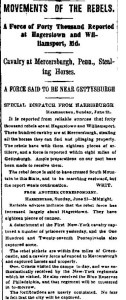The New York Freeman was a Roman Catholic, pro-Confederate newspaper that was shuttered by Secretary of state William Seward for anti-Union activity from August 1861 to April 1862. This reprinted editorial criticizes the Lincoln administration for acting above the law. I was taken by the image of putting a pistol to Lincoln’s ear, even though the Freeman said it did not have the right to do that.
From the Richmond Daily Dispatch June 23, 1863:
Bold language for a New York paper.
The New York Freeman’s Journal has an article on the manifold outrages committed by Lincoln on the rights (if they have any) of the citizens of the United States:
Is it not evident that the Lincoln Administration, despising the United States Constitution, which all its members swore to obey, are acting as if they were dispensed from all law save that of force? Are they not all scholars and followers of the sophist Seward, and acting on his “higher law?”
If so, what is the duty of law abiding freemen? We American citizens have sworn no obedience to men. Ours is “a Government of laws and not of men.” Our rulers are our fellow-citizens — our public servants, not our masters. This is the fundamental plan and Constitution that the people of all the States, using the God-given right of forming a Government to suit them, have established. Our public servants are as much subject to the Constitution and laws as are the people. They have no more right to kidnap Vallandigham than we have to kidnap David Tod, Governor of Ohio, or Seward, or Lincoln. They have no more right to send bayonets to overawe the freemen of Indiana or New Jersey, constitutionally and peaceably assembled, than we have to dictate proclamations to Lincoln with a pistol at his ear.
Has the Lincoln Cabinet adopted the slang of the Richmond newspaper writers? Does the Administration make the dreadful mistake of taking the patience and forbearance of the Northern people for abject cowardice? It looks like it — but, if so, the hallucination is destined to a bloody awakening! We are law abiding. We will retreat from conflict, “even to the wall!” But, if we be pushed to the wall — If no choice be given us but to resist, or to yield to the Administration as slaves to masters — then the Administration will find that, even if our liberties be gone, it is not to such masters as they that the people will yield.
In the interest of justice, of good order, of social tranquility, we appeal to Lincoln and his surroundings. We do not appeal to their justice, for they are devoid of it. We do not appeal to their magnanimity, for they never had it. We, do not appeal to their common sense, for their conduct forbids it. We appeal to what we know exists — their fears. By their cowardly fears we appeal to them not to push the law abiding people of the North to the wall, in defence of rights we will never surrender to them! Woe to them, if the lawlessness of the Administration shall extend to the people!
Of course, Lincoln’s argument is that the U.S. Constitution gives the Executive greater power during a rebellion. And certainly the rebellion was still vigorous. As can be seen from the clipping from The New York Times of June 22, 1863, 150 years ago today Confederate forces were reported near a place called Gettysburgh in Pennsylvania. However, there seemed to be a bit of a disconnect in the issue because the lead story with a June 21 dateline from the Army of the Potomac included this subheadline: The Prospect of a Pennsylvania Invasion Growing Less
The Times found space on the bottom right of its front page for the following:


